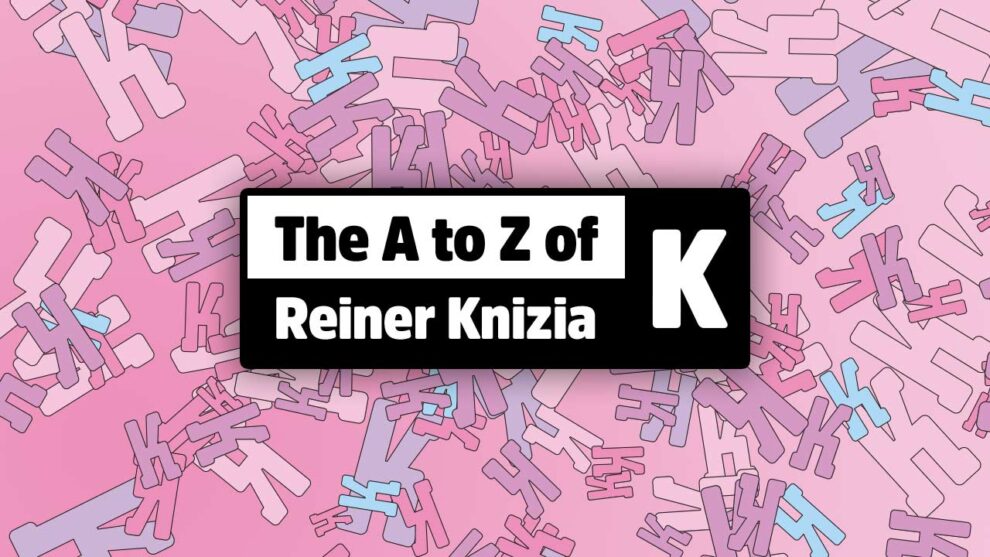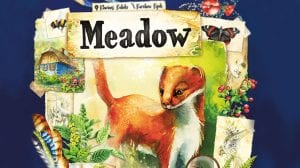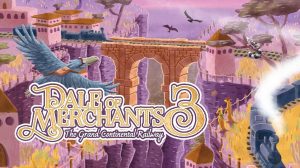The year 2025 marks the 40th anniversary of Dr Reiner Knizia’s career as a board game designer – his first published game, Complica, was released in a magazine in 1985 (although he’d self-published games before then as well).
Since then, Knizia has designed and published over 800 games and expansions, many of which are critically acclaimed. Put simply, Reiner Knizia is the landscape on which all other modern designers build their houses.
To celebrate Knizia’s career and back catalogue, Meeple Mountain are taking things back to basics to consider the ABC of Reiner Knizia: one game for each of the 26 letters of the alphabet.
This time: The Letter ‘K’.
K – Keltis (2008)
The Spiel des Jahres is the most prestigious award in the board gaming world. Presenting its first Game of the Year award in 1979 to Hare & Tortoise, the German-based awards and associated activities aim to “promote the values of gaming in society, among friends, and within families”. Many credit the awards as a driver for the innovative games that were released towards the end of the twentieth century, leading to the rise of German-style board games (aka Eurogames) and the flourishing hobby that we see today.
As a key tabletop figure and practitioner of the simple rules and family gaming rewarded by the Game of the Year jury, you might expect Knizia’s to be a common name in the records of Spiel des Jahres history. And indeed his name has appeared frequently in the rosters since his first nomination in 1992 for Quo Vadis.
Yet despite 13 Nominations and 11 Recommendations, Knizia’s track-record for the coveted Game of the Year award is surprising.
In some years, the competition was stiff and games which might have stood a chance in other years were up against true giants of the tabletop world. Medici, Winner’s Circle, Ingenious, Amun-Re, FITS, and The Quest for El Dorado were beaten by The Settlers of Catan, Carcassonne, Ticket to Ride, Alhambra, Dominion, and Kingdomino respectively.
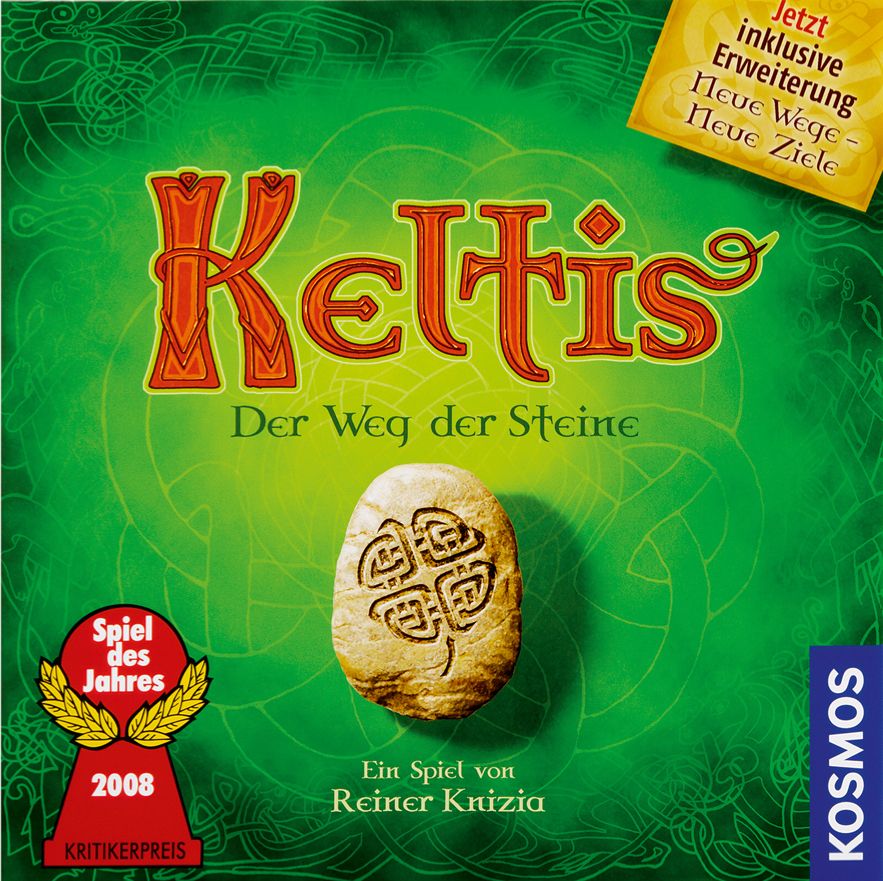
Eligibility and originality for the award is also an odd and specific thing. In 1993 Knizia’s sublime Modern Art and not-sublime-but-still-good Tutankhamen both lost out. What beat them? Call My Bluff (aka Bluff, Liar’s Dice, Perudo) which was originally released 6 years earlier and is so similar to the 200 year old Liar’s Dice that even its BoardGameGeek listing gets confused between them. There’s also the 2019 winner Just One which won over Knizia’s L.L.A.M.A. and yet is just a repaint and rename of a 2017 release called We Are The Word.
Perhaps the cruelest jury decision occured when both Through the Desert and Tigris & Euphrates lost out to Elfenland (a reimplementation of 1992’s Elfenroads). Jury member Jochen Corts recalls 1998 as “closer than ever before. Despite intensive discussions in a closed meeting and subsequent email exchanges in a newly designed voting process, the tie between two competitors had to be broken by a tiebreaker vote by the chair.” This is not intended as a slight on Alan R. Moon’s precursor to Ticket to Ride, but with the hindsight of almost 30 years it’s clear that it wasn’t the right decision. Perhaps the one-two punch of two of Knizia’s most respected masterpieces split the jury’s votes and Elfenland squeezed through the gap.
Knizia himself is (outwardly at least) relaxed about these things. “Awards are nice,” he said in an interview with Funagain, “but you cannot make your happiness dependent upon awards: you win some and you lose some… The ultimate motivation must come from inside.” Agreeing with the aims of the Spiel des Jahres, he says that the value of awards comes from increasing public awareness of games and contributing to “the growth of the one thing that is close to all our hearts – games.”
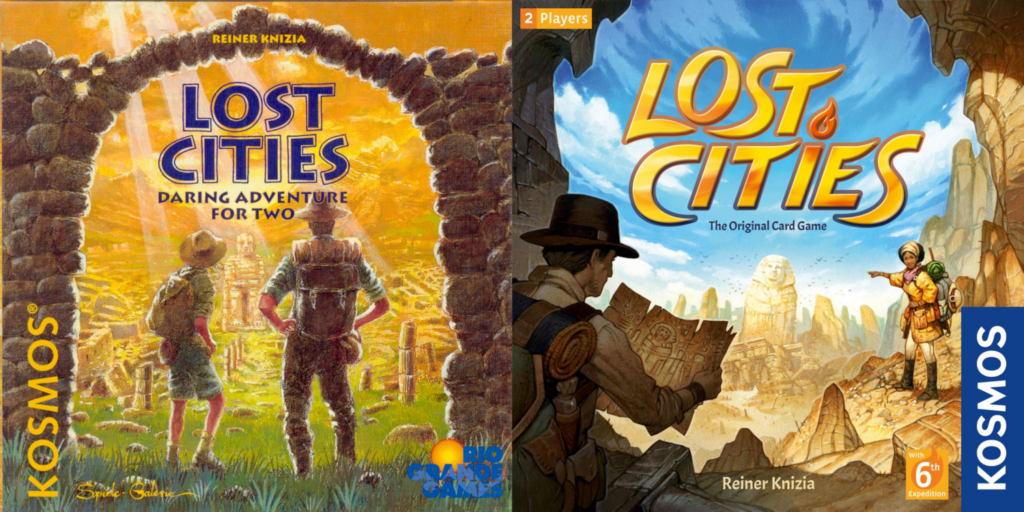
In fact, despite all the Nominations and Recommendations, Knizia has only won the Spiel des Jahres once, with Keltis. A variant of a reimplementation, and a rare instance of a Knizia game where the theme was stripped away.
Keltis originates from 1999’s Lost Cities in which two opponents play cards to develop expeditions, but starting an expedition is costly so you’d better be confident you’ll make those points back. Now recognised as a modern classic and one of the great ‘couples’ games, Lost Cities didn’t even receive a nomination on release or much in the way of recognition. “I couldn’t sell it initially,” said Knizia in an interview with Matthew Gravelyn, “I went from publisher to publisher and nobody wanted it until I went back to KOSMOS and, essentially, urged and pressured them into doing it because I was so convinced. And I think they never regretted it.”
An inauspicious start, but Lost Cities has become the most owned Knizia game by BoardGameGeek users, with over 72 thousand copies currently registered on the site. “Lost Cities is a tense, quick game,” says Meeple Mountain’s Andrew Lynch, “part of what’s so wonderful about it is that the tension only becomes more obvious the more you play.”
It’s also a surprisingly thematic experience. It might not feel like you’re actually going on an expedition, but what’s being recreated is “the feeling of making promises that you don’t know if you’ll be able to keep,” says bdpatterns, “just like a real adventurer securing funds for an expedition.” You aren’t pretending to be an explorer, but the game makes you wrestle with the dilemmas an explorer would face. “When you play Lost Cities, you are making decisions about the future, about allocation of time and resources, that are based on partial information and a hunch,” says Lynch, “Sounds spot on for an expedition to me.”
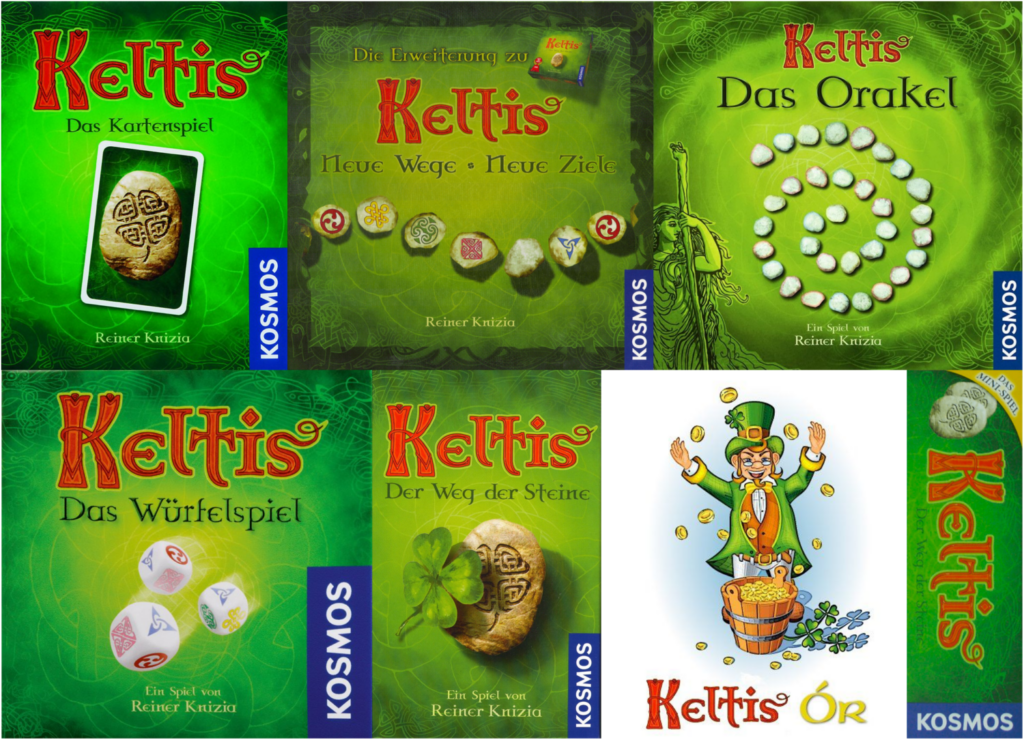
Knizia later designed a board game version of Lost Cities, expanding it to 4 players and adding paths for meeple to travel along as well as bonus tokens to claim. Except, when Knizia presented it to publisher Kosmos, they wanted it for their abstract line. Gone were the theme, three round structure, and requirement to play cards from low to high values. The result is 2008’s Keltis, a subtly fairer game involving stones, paths and lots of green.
“In Keltis, Reiner Knizia sticks with the formula that he knows works, and then, as is his wont, he improves upon it,” says Meeple Mountain’s David McMillan in his review of Keltis, “I like the game so much, in fact, that I actually prefer it over Lost Cities… Keltis is Reiner Knizia at the top of his game.”
The Spiel des Jahres jury agreed, finally awarding Knizia the Game of the Year prize in 2008. The success of Keltis led to a blooming of the lineage over the following five years. There’s a branching paths expansion, a single path stand alone game, a card game, a push-your-luck adaptation, a two-player mini version, and two different dice implementations. And in 2012 the game received a new edition that included the 2009 expansion. That’s a lot of green!
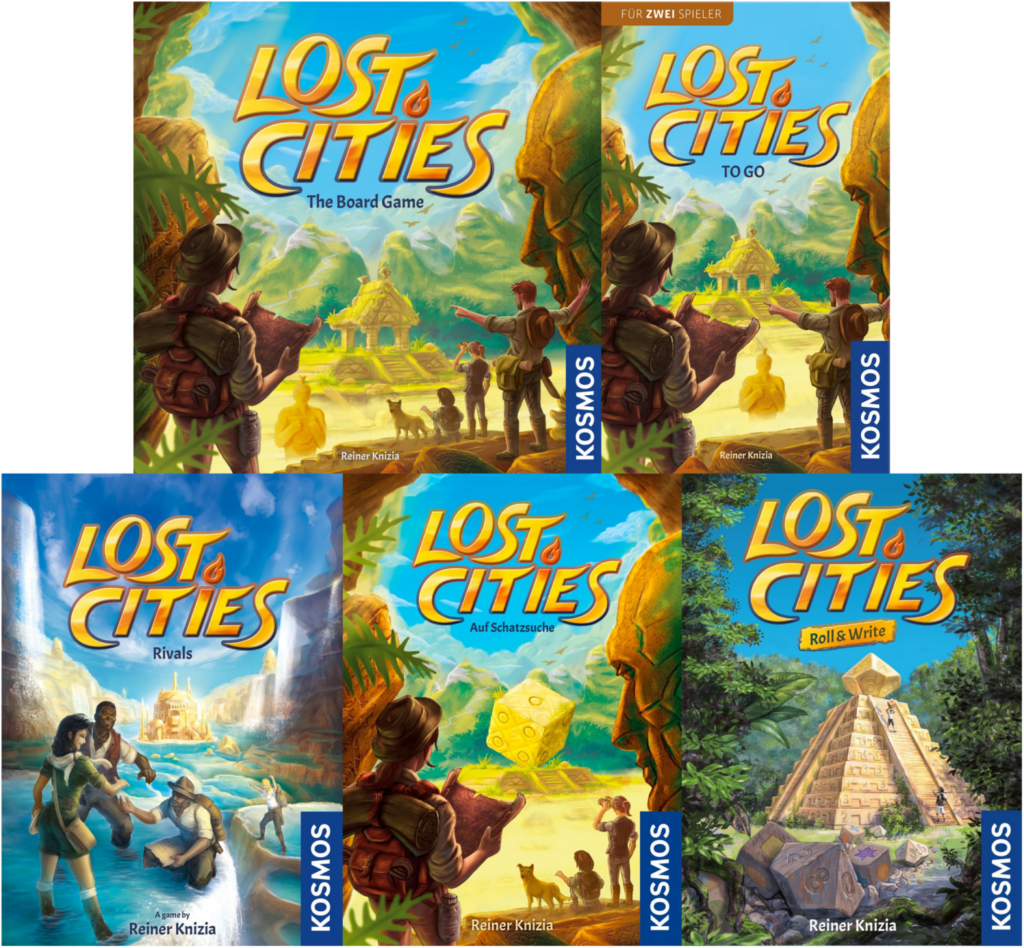
Knizia, however, didn’t forget about Lost Cities. Europe may have been presented with the abstract Keltis, but that same year publisher Rio Grande Games released Knizia’s original Lost Cities: The Board Game in North America. With the subsequent success of the Keltis line, further Lost Cities games weren’t a priority, but in the second half of the 2010s the eye of Knizia turned back towards the more thematic side of the family. Starting in 2016, Knizia has released two mini-expansions for the original Lost Cities and a further four standalone games in the line. Two of those are implementations of Keltis titles whilst the other two are entirely new (including a third different dice game!).
It’s very pleasing to think that the game that kickstarted to the creation of two of Knizia’s largest families of games is also the game that won the largest family gaming award in the hobby.
To discover Knizia’s knack of pushing a design space, with changes including auctions, dice and intertwined paths, we recommend our own Andrew Lynch’s exploration of the Lost Cities series and Lucas Hedgren’s deep dive into the evolution of Keltis over with The Opinionated Gamers.
King Knizia’s Kaleidoscopic Knees Up!
Keltis might kickoff Knizia’s k-ollection but there are other keepers keen to know you:
Karate Tomate – Sure, it’s a middling (and slightly ugly) Knizia card game but there’s a spark of something good here and that’s impressive for a game that can successfully play up to 10. Plus it’s about a culinary martial arts tournament, with various vegetables in karate gi. Need we say more?
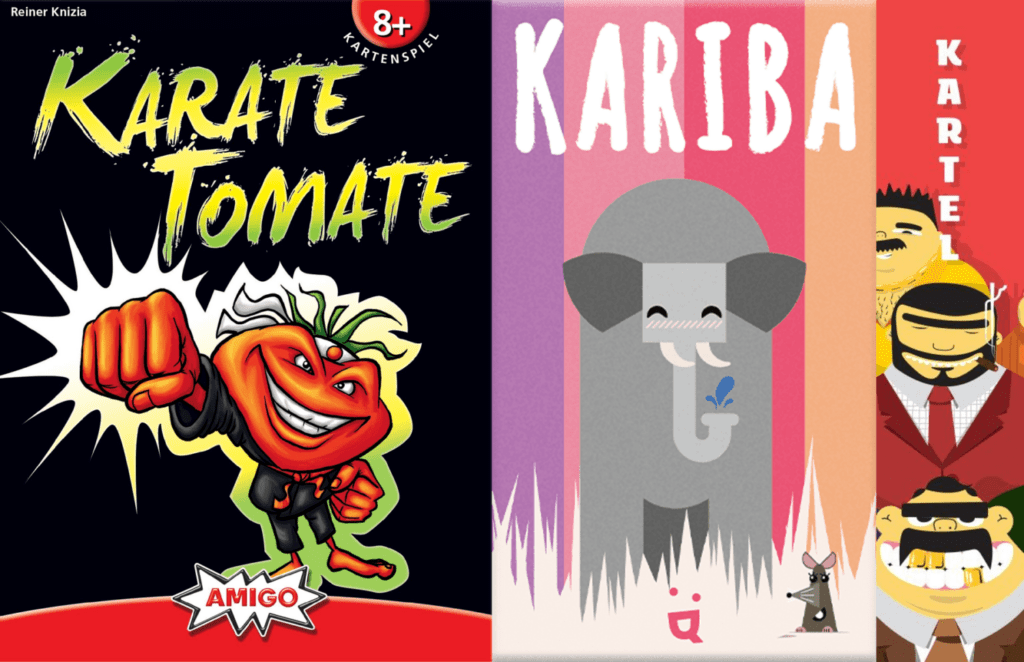
Kariba – Is this the cutest game in the entire Knizia catalogue? Quite possibly. With delightful animal art by Felix Kindelán and published by Helvetiq, this is a quick family game with more to it than meets the eye. “In Kariba you’re constantly evaluating just how much you’re willing to sacrifice to make a good play,” says Meeple Mountain founder Andy Matthews in his review of Kariba, “It’s a delightful push and pull between your opponents… If you get a chance to grab this one, you won’t regret it.”
Kartel – Like Kariba before it, this circling game is also from publisher Helvetiq, with art by Kindelán and packs a surprising amount of game into its little box. Players try to collect gangsters whilst ensuring that the right gang bosses end up in jail, as members of any gang still with a boss at the end of the game will lose you points. Perhaps not as strong a circular game as Kariba (and a slightly bulkier box) but it’s worth trying for a few minutes of fun.
King Arthur – Knizia is a known technophile, always interested in how modern advancements can expand and improve tabletop gaming. One of his more notable journeys into the electronic genre is King Arthur, first released in 2003 and later updated to be used with a smartphone in 2014. Take on the role of a knight travelling the land, but know that your deeds are recorded and un-knightly deeds will be punished!
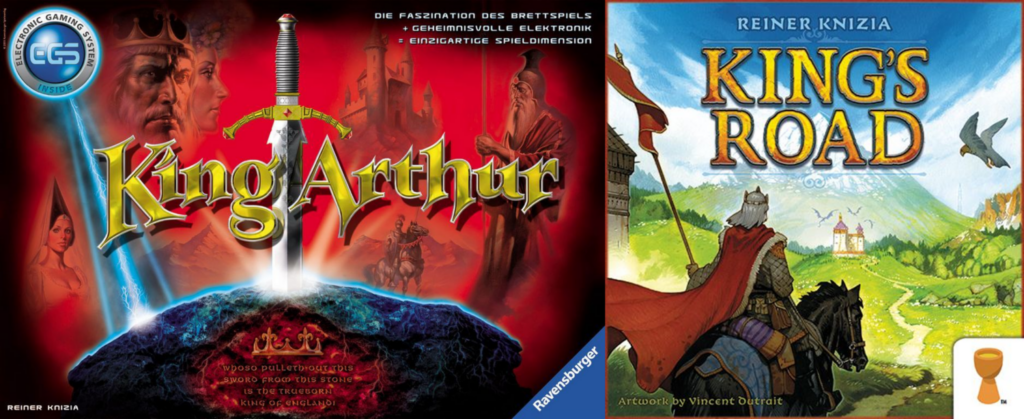
King’s Road – A reimplementation of Imperium, originally released in a compendium in 1994 and again in 2001, King’s Road is an area-majority game where players need to gain the King’s favour as he travels around the land. Released in 2017 at the start of the Rei-naissance, this one slipped under many people’s radars but it’s worth looking out if you can find it.
–
The ‘K’s are kaput! Are you donning the knuckledusters to give us a keyboard keelhauling or are you kindly banging the kudos-kettledrum and proclaiming that we deserve a knighthood for our knowledge? What ‘K’ game would you keep in your kitbag? Let us know in the k-omments below and check out the rest of the Reiner Knizia Alphabet here!


